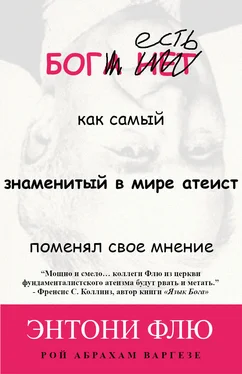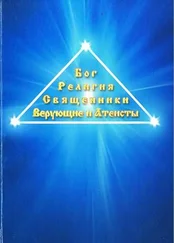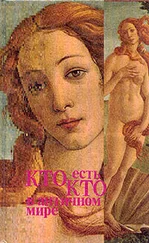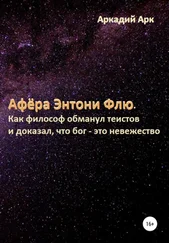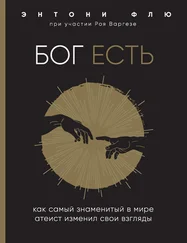Глава 5
КТО НАПИСАЛ ЗАКОНЫ ПРИРОДЫ?
1. Stephen Hawking, A Brief History of Time (New York: Bantam, 1988), 175, 174.
2. Gregory Benford, “Leaping the Abyss: Stephen Hawking on Black Holes, Unified Field Theory and Marilyn Monroe,” Reason 4.02 (April 2002): 29.
3. Albert Einstein, цитируется по: Timothy Ferris, Coming of Age in the Milky Way (New York: Morrow, 1988), 177.
4. Antony Flew, God and Philosophy (New York: Dell, 1966), 15.
5. Max Jammer, Einstein and Religion (Princeton, NJ: Princeton University Press, 1999), 44.
6. Jammer, Einstein and Religion, 45.
7. Jammer, Einstein and Religion, 45–46.
8. Jammer, Einstein and Religion, 48.
9. Jammer, Einstein and Religion, 150.
10. Jammer, Einstein and Religion, 51.
11. Jammer, Einstein and Religion, 148.
12. Albert Einstein, Lettres a Maurice Solovine reproduits en facsimile et traduits en francais (Paris: Gauthier-Vilars, 1956), 102–3.
13. Albert Einstein, Ideas and Opinions, trans. Sonja Bargmann (New York: Dell, 1973), 49.
14. Einstein, Ideas and Opinions, 255.
15. Jammer, Einstein and Religion, 93.
16. Albert Einstein, The Quotable Einstein, ed. Alice Calaprice (Princeton, NJ: Princeton University Press, 2005), 195–6.
17. Большинство цитат взято из Roy Abraham Varghese, The Wonder of the World (Fountain Hills, AZ: Tyr, 2003).
18. Werner Heisenberg, Across the Frontiers, trans. Peter Heath (San Francisco: Harper & Row, 1974), 213.
19. Werner Heisenberg, Physics and Beyond (San Francisco: Harper & Row, 1971), выдержки приведены в публикации Timothy Ferris, ed., The World Treasury of Physics, Astronomy and Mathematics (New York: Little, Brown, 1991), 826.
20. Erwin Schrödinger, My View of the World (Cambridge: Cambridge University Press, 1964), 93.
21. Max Planck, Where Is Science Going? trans. James Murphy (New York: Norton, 1977), 168.
22. Max Planck, цитируется по: Charles C. Gillespie, ed., Dictionary of Scientific Biography (New York: Scribner, 1975), 15.
23. Paul A. M. Dirac, “The Evolution of the Physicist’s Picture of Nature,” Scientific American 208, no. 5 (May 1963): 53.
24. Charles Darwin, The Autobiography of Charles Darwin 1809-1882, ed. Nora Barlow (London: Collins, 1958), 92–3.
25. Paul Davies, Templeton Prize Address, May 1995, http://aca.mq.edu.au/PaulDavies/prize_address.htm. See also Davies’s “Where Do the Laws of Physics Come From?” (2006), http://www.ctnsstars.org/conferences/papers/Wheredothelawsofphysicscomefrom.doc.
26. John Barrow, Templeton Prize Address, March 15, 2006, http://www.templetonprize.org/barrow_statement.html.
27. John Foster, The Divine Lawmaker: Lectures on Induction, Laws of Nature and the Existence of God (Oxford: Clarendon, 2004), 160
28. Richard Swinburne, “Design Defended,” Think (Spring 2004): 14.
29. Paul Davies, “What Happened Before the Big Bang?” in God for the 21st Century, ed. Russell Stannard (Philadelphia: Templeton Foundation Press, 2000), 12.
Глава 6
ЗНАЛА ЛИ ВСЕЛЕННАЯ, ЧТО МЫ ПОЯВИМСЯ?
1. Freeman J. Dyson, Disturbing the Universe (New York: Harper & Row, 1979), 250. Также цитируется по: John Barrow and Frank Tipler, The Anthropic Cosmological Principle (Oxford: Clarendon, 1988), 318.
2. John Leslie, Infinite Minds (Oxford: Clarendon, 2001), 213.
3. Leslie, Infinite Minds, 203–5.
4. Martin J. Rees, “Numerical Coincidences and ‘Tuning’ in Cosmology,” Astrophysics and Space Science 285 (2003): 376.
5. Rees, “Numerical Coincidences and ‘Tuning’ in Cosmology,” 385.
6. Paul Davies, “Universes Galore: Where Will It All End?” http://aca.mq.edu.au/PaulDavies/publications/chapters/Universesgalore.pdf.
7. Richard Swinburne, “Design Defended,” Think (Spring 2004): 17.
8. Rees, “Numerical Coincidences and ‘Tuning’ in Cosmology,” 386.
9. Davies, “Universes Galore: Where Will It All End?”
10. Martin Rees, “Exploring Our Universe and Others,” in The Frontiers of Space (New York: Scientific American, 2000), 87.
Глава 7
КАК ПОЯВИЛАСЬ ЖИЗНЬ?
1. Antony Flew, God and Philosophy (Amherst, NY: Prometheus, 2005), 11.
2. Richard Cameron, “Aristotle on the Animate: Problems and Prospects,” Bios: Epistemological and Philosophical Foundation of Life Sciences, Rome, February 23–24, 2006.
3. John Haldane, “Preface to the Second Edition,” in Atheism and Theism (Great Debates in Philosophy), J. J. C. Smart and John Haldane (Oxford: Blackwell, 2003), 224.
4. David Conway, The Rediscovery of Wisdom (London: Macmillan, 2000), 125.
5. David Berlinski, “On the Origins of Life,” Commentary (February 2006): 25, 30–31.
6. Carl Woese, “Translation: In Retrospect and Prospect,” RNA (2001): 1061, 1056, 1064.
7. Paul Davies, “The Origin of Life II: How Did It Begin?” http://aca.mq.edu.au/PaulDavies/publications/papers/OriginsOfLife_II.pdf.
8. Andy Knoll, PBS Nova interview, May 3, 2004.
9. Antonio Lazcano, “The Origins of Life,” Natural History (February 2006).
10. John Maddox, What Remains to Be Discovered (New York: Touchstone, 1998), 252.
11. George Wald, “Life and Mind in the Universe,” in Cosmos, Bios, Theos, ed. Henry Margenau and Roy Abraham Varghese (La Salle, IL: Open Court, 1992), 218.
Глава 8
ПОЯВИЛОСЬ ЛИ ЧТО-ТО ИЗ НИЧЕГО?
1. “Something Good,” слова и музыка Ричарда Роджерса (Richard Rodgers), 1965.
2. Stephen Hawking, A Brief History of Time (New York: Bantam, 1988), 174.
3. Antony Flew, “Stephen Hawking and the Mind of God” (1996), http://www.infi dels.org/library/modern/antony_fl ew/hawking.html.
4. Hawking, A Brief History of Time, 9.
5. Antony Flew, “The Legitimation of Factual Necessity,” in Faith, Scepticism and Personal Identity, ed. J. J. MacIntosh and H. A. Meynell (Alberta: University of Calgary Press, 1994), 111–17.
6. David Conway, The Rediscovery of Wisdom (London: Macmillan, 2000), 111–12.
7. Richard Swinburne, The Existence of God (Oxford: Clarendon, 2004), 142.
8. Richard Swinburne, “The Limits of Explanation,” in Explanation and Its Limits, ed. Dudley Knowles (Cambridge: Cambridge University Press, 1990), 178–79.
9. John Leslie, Infinite Minds (Oxford: Clarendon, 2001), 194–95.
10. Stephen Hawking, Black Holes and Baby Universes (New York: Bantam, 1993), 172.
11. Leslie, Infinite Minds, 193–94.
12. Swinburne, The Existence of God, 152.
Глава 9
В ПОИСКАХ МЕСТА ДЛЯ БОГА
1. John Gaskin, “Gods, Ghosts and Curious Persons,” неопубликованная работа.
2. Thomas F. Tracy, God, Action and Embodiment (Grand Rapids, MI: Eerdmans, 1984), 147, 153. See also The God Who Acts, ed. Thomas F. Tracy (University Park: Pennsylvania State University Press, 1994).
3. Brian Leftow, личная беседа с автором, Oriel College, Oxford University, October 2006.
4. David Conway, The Rediscovery of Wisdom (London: Macmillan, 2000), 134.
ПРИЛОЖЕНИЕ А : «НОВЫЙ АТЕИЗМ»
1. Hao Wang, A Logical Journey: From Gödel to Philosophy (Cambridge, MA: MIT Press, 1996), 316.
Читать дальше
Конец ознакомительного отрывка
Купить книгу
